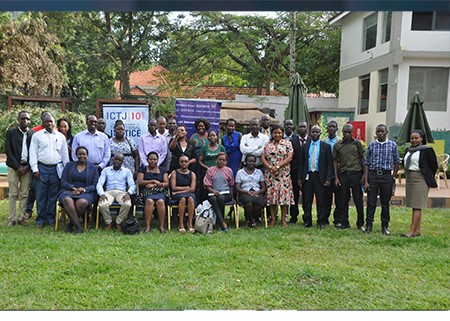Background
For years, ICTJ has championed the media and the role it plays in supporting truth-seeking and advancing accountability and redress for victims of conflict-related atrocities. In the places where we work, from South Africa, to the Gambia, Guatemala, Colombia and the Philippines, media projects and coverage—both mainstream and alternative—have been crucial in ensuring participation, mediating public discourse, contributing to acknowledgment for victims, and revealing long-hidden truths about crimes. In this era of political attacks on the independent media, the role of media in supporting transitional justice efforts, presenting unheard voices, and offering unfiltered historical records may be more critical than ever before.
Still, there are often tensions in the relationship between journalists, advocates, and victims. When needed, ICTJ has challenged the media to resist the politicization of narratives and uphold victims’ rights and dignity, and it works to build the media’s capacity and raise its awareness about transitional justice issues in post-conflict settings and emerging democracies around the world. This month, we share a dispatch from our work in Uganda.
Strengthening the Media’s Role in Transitional Justice Processes in Uganda
In the late 1980s, the The Lord’s Resistance Army (LRA) launched a prolonged insurgency in northern Uganda. Throughout the conflict, both the LRA and the Ugandan military have been implicated in human rights violations, including killings, sexual violence, and widespread kidnappings. The LRA, in particular, gained notoriety for its extensive use of child soldiers. While the fighting has ebbed in the last decade, northern Uganda still bears the scars of this horrific conflict.
Grace Acan is an activist at the Uganda Women’s Advocacy Network and a victim of the war. She says the national media has played an important role in telling the rest of the country about the atrocities committed during the war. “Without the media,” she says, “Ugandans wouldn’t have known about the atrocities committed during the war in Northern Uganda.”
While grateful for the media’s role in bringing attention to northern Uganda’s plight, Acan has also seen firsthand how negligent media coverage can inflame tensions and re-traumatize victims. She remembers how at a memorial service a formerly abducted woman who had been forced to marry LRA warlord Joseph Kony began crying while talking about the disappearance of her daughter during the war. One of the journalists at the memorial published a story—without interviewing the woman at all—claiming “the woman was crying because she was missing Kony.” Acan says that, when the woman saw the story and complained to the media house, “nothing was done for her. And due to the mistake the journalist made, the victim to date lives with pain and sadness in her heart.”
To help Ugandan journalists play a more constructive role in their country’s transitional justice effort, ICTJ, in partnership with the ICC Public Affairs Office, organised a workshop for members of Uganda’s media last February. Over two days, journalists explored their role in advancing accountability for international crimes and justice for victims of past atrocities, helped improve their capacity to report accurately and objectively on transitional justice, and discussed how to better promote the effective participation of victims and the public. Through the training, journalists learned about transitional justice and their influence on public discourse regarding accountability for mass atrocities. They also gained skills and insights on how to cover stories about victims in a sensitive and ethical manner, by taking into account the principle of doing no harm.
Okello Bernard is a reporter with Gulu FM, a radio station based in the northern city of Gulu, a hotspot during the conflict. As a journalist he tries to bring attention to attacks on camps for internally displaced persons and to the suffering of victims. He attended the workshops organized by ICTJ and the ICC Public Affairs Office and says he looks forward to using the training he received. “The knowledge acquired from this training will help me to report better on transitional justice and write victim-sensitive stories and court proceedings,” he says. “I have also established communication channels for obtaining information about the criminal proceedings at the International Crimes Division and at the ICC.”
At the end of the workshop, Bernard and other journalists pledged to support ongoing and proposed transitional justice processes by providing balanced, accurate, informed, and conflict-sensitive information to the public.
Beyond building the capacity of journalists, ICTJ has worked for years to train and empower advocates and victims throughout its global programs. ICTJ continually assesses the role of the media in transitional justice processes, and conducts research on the subject to inform practitioners and stakeholders and help them to develop more effective media engagement strategies.
PHOTO: Journalists participate in an ICTJ training in Kampala. (Mazinga Ahmed/Oryem Nyeko)
